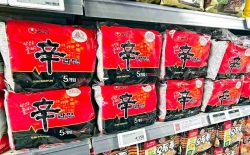12:30 JST, May 21, 2022
The storage capacity for treated water at the Fukushima No. 1 nuclear power plant is approaching its limit, hindering decommissioning work. The government and Tokyo Electric Power Company Holdings Inc. must steadily move forward with plans to discharge the water as soon as possible.
Contaminated water produced when cooling molten fuel in the reactors is treated and stored at the site in tanks that currently hold 1.3 million tons of water. Last year, the government approved a decision to release the water into the ocean because it is hindering decommissioning work, and TEPCO applied for approval of a plan to construct the necessary facilities.
The Nuclear Regulation Authority (NRA) has recently approved this plan. After 13 review meetings, the authority determined that there were no safety issues with an ocean release. This represents a major step forward in the discharge procedure.
TEPCO has already begun preparations for the construction of an undersea tunnel that will serve as an offshore discharge route. Completion of the tunnel is expected to take some time, and the discharge is not expected to begin until next spring or later.
The amount of treated water is increasing day by day. The tanks are expected to reach full capacity by next summer or autumn. There is no time to spare in the construction schedule. It is essential to proceed with the plan without delay.
Local fishermen and others concerned have voiced their opposition to the plan, claiming that the release of the treated water could lead to harmful rumors about marine products. The government must listen to the voices of those involved in the fishing industry and explore effective measures to prevent deleterious hearsay.
Even after the treatment process, the water still contains radioactive tritium. However, rainwater and seawater also contain trace amounts of tritium. The treated water will be diluted with large amounts of seawater before being released into the ocean. The amount of tritium in the discharged water will be one-seventh of the concentration permitted under the World Health Organization’s guidelines for drinking water.
However, information about the treated water is not widely known. According to a survey by the Reconstruction Agency, only about 40% of the public is aware of the government’s plan to discharge treated water that has been diluted.
The government and TEPCO must step up their efforts to disseminate information and deepen the public’s understanding regarding the safety of the discharge.
In the international community, ocean release is understood to be the most realistic option for tritium-laden wastewater discharged from nuclear facilities.
In April, an International Atomic Energy Agency (IAEA) mission, including members from China and South Korea, published a report that concluded that the release plan was appropriate. The government must continue to work with the IAEA to increase transparency regarding the discharge.
The United Kingdom is in the process of removing import restrictions on food and other products from Fukushima Prefecture. Excessive and baseless restrictions are being reassessed in many countries. The government should also lobby China and South Korea, which continue to impose import restrictions.
(From The Yomiuri Shimbun, May 21, 2022)
Top Articles in Editorial & Columns
-

40 Million Foreign Visitors to Japan: Urgent Measures Should Be Implemented to Tackle Overtourism
-

University of Tokyo Professor Arrested: Serious Lack of Ethical Sense, Failure of Institutional Governance
-

Policy Measures on Foreign Nationals: How Should Stricter Regulations and Coexistence Be Balanced?
-

China Provoked Takaichi into Risky Move of Dissolving House of Representatives, But It’s a Gamble She Just Might Win
-

PM Takaichi Should Help Young Japanese Break Seniority Barrier to Vitalize Politics
JN ACCESS RANKING
-

Japan Institute to Use Domestic Commercial Optical Lattice Clock to Set Japan Standard Time
-

Israeli Ambassador to Japan Speaks about Japan’s Role in the Reconstruction of Gaza
-

Man Infected with Measles May Have Come in Contact with Many People in Tokyo, Went to Store, Restaurant Around When Symptoms Emerged
-

China Eyes Rare Earth Foothold in Malaysia to Maintain Dominance, Counter Japan, U.S.
-

Prudential Life Insurance Plans to Fully Compensate for Damages Caused by Fraudulent Actions Without Waiting for Third-Party Committee Review



















